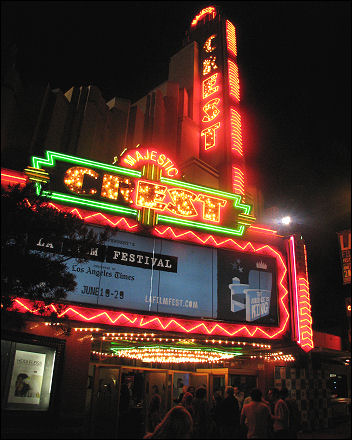Earlier today Fox 411’s Roger Friedman bluntly called Hancock, the Will Smith comic whatever that opens Tuesday, “a $150 million disaster…one of the worst family holiday weekend releases of recent memory — jaw-droppingly so. And that’s hard to do, since it clocks in at a mere wisp of one hour and 20 minutes. In such brevity there should be a reward. After all, Hancock, directed by Peter Berg, is shorter than most Woody Allen comedies. There’s nothing funny here, however, or witty or clever or even developed beyond an idea.”
Yesterday ‘s Tracking
WALL*E is running 88, 45, 26 — extraordinary numbers for a family/kids movie because the kids aren’t polled. Figure $50 to $60 million. Wanted, also opening this weekend, has similar numbers — 86, 44, 26 — but without the kid factor and the ceiling on violence (plus the fact that the movie is brutish and rancid) it’ll do a fairly safe $30 million, maybe a bit more. Never has a worse movie
Will Smith‘s Hancock, opening on Tuesday, July 1st, is running at 91, 56 and 19 — obviously quite strong.
Guillermo del Toro‘s Hellboy 2: The Golden Army (Universal), opening on 7.11, is running at 74, 33 and 3. That’s a little weak, no? On one hand you could say people don’t seem to want to go there again. On the other hand this isn’t looking too bad since there’s a heavy first choice on Hancock and The Dark Knight. You could say that Hancock has to open and disappoint and get out of the way for Hellboy 2 to get rolling.
Journey to the Center of the Earth (Warner/New Line, 7.11) is running 73, 23 and 1. Not good. Doing even worse is Eddie Murphy‘s Meet Dave (20th Century Fox) at 49, 17 and 0 — toilet time. it opens in two weeks and it’s dead. It’s obviously a referendum on Murphy’s fan base.
The Dark Knight (Warner Bros., 7.18) is looking huge — 76, 60 and 19, and it’s three weeks away. Mamma Mia (Universal), running against the bat, is 62, 23 and 5. Obviously an older female thing. “Definite interest’ running in the mid 30s. Tracking like Hairspray.
Two Fresh Faces
If you’re an MSNBC junkie you’re going to feel deluged these days by two ads (i.e., advertisers) in particular — those series of singing freecreditreport.com spots starring that guitar-strumming French-Canadian guy Eric Violette, and that amusing Travelocity ad showing the young married couple trying to talk to each other over a loud drilling sound coming from the apartment above.
Here are two other Violette/freecredit ads — the pizza restaurant and driving in the beater. There’s no sign of a Violette bio on the IMDB, but one nonetheless presumes he has a Los Angeles-based agent. I’m saying this because he’s got a nice look and an easy likable vibe that would fit right into under-25 throwaway movies or Entourage or what-have-you.
I’m also running this because I can’t find an embedded copy of the Travelocity ad. It’s a very funny due to the fast timing of the Jewish guy playing the husband (“Really?”), but it’s also pulsing with emotional subtlety. Look at the wife’s face as he tries to speak to her. Is she a little bit sick of him? Could they be on the verge of a divorce? or is she just trying to quietly repress her frustration at the drilling noise? She doesn’t even crack a slight smile at what he’s saying, and he’s hilarious. I’ve seen this ad maybe 20 times and I’ve never tired of it. And who’s the guy?
Breathtaking PUMAs
“The stated goals of PUMA are to: 1. Support Senator Hillary Clinton. 2. Lobby and organize for changes in leadership in the DNC. 3. Critique and oppose misogyny, discrimination, and disinformation in the mainstream media, including mainstream blogs and other outlets of new media. 4. To support the efforts of those political figures who have allied themselves with Hillary Clinton and who have demonstrated commitment to the first three goals. 5. [Help to] destroy America by voting against their values.” — straight from the PUMA Wikipedia page.
The PUMAs feel that their candidate lost, in part, because the misogynists ganged up on her and pulled strings that led in some roundabout way to her defeat. What is a reasonable person supposed to say to such tripe? Hillary Clinton’s campaign was about arrogance, bullying, bad planning, old-school negativity, racial innuendo, taking the scummiest road imaginable, using any ruse or trick in the dirty book of politics to appeal to the dumbest people out there, playing upon gender loyalty, downing shots with beer-gut racists, crying when it suited her drama-queen purposes, trying out cheap gimmicks like the gas tax idea, implying a Muslim heritage or allegiance on Obama’s part, praising McCain over Obama, angrily saying “shame on you, Barack Obama!” when he correctly repeated her NAFTA views, etc.
In short, it was one of the most despicable campaigns in modern political history — relentless, ghastly, appalling. And yet the die-hard PUMA people, stunningly, mind-blowingly, actually believe that the people who banded together and defeated Clinton’s campaign — which her all-together-now female supporters felt was a non-negotiable historical inevitability — are in some way demonic and hateful, and that the only thing for them to do now is to support John McCain.
There is no question that the Clintons earned their rep move by move, and that they lost by their own hand. The academic woman who was fired by the Obama campaign for calling Hillary a “monster” was Joan of Arc in my mind — burned at the stake for being true to her beliefs, and to God’s radiant light. Some people say never forget the Holocaust or 9/11. I say never forget what the Clintons did and what they were each and every day during the ’08 Democratic primary campaign.
“Flawless Masterpiece”
“While fandom might be nervous that the film has been hyped too hard or it won’t deliver what we all hoped it could, I am here to report The Dark Knight is a masterpiece,” writes Collider‘s Steve Weintraub. “And unlike Batman Begins, which had a weak third act, The Dark Knight is flawless beginning to end.
“It’s very rare for me to say this, but I have nothing to nitpick. Usually when I see any movie I wish they had done something differently, but The Dark Knight is the comic book movie geeks have waited their entire lives for. It’s easily the best Batman movie and it’s also one of the best comic book movies to ever hit the screen.
“But calling it a ‘comic-book movie’ does the film a disservice. It’s a great movie, regardless of the fact that Batman is the star.
“And since everyone’s been asking me whether Heath Ledger‘s performance is Oscar worthy…look, it’s June. The big Oscar movies are still months away and who knows what other performances will hit movie screens? But Heath’s performance is as good as the hype, and I was sad when the film ended, as I knew this was the last performance from a gifted actor. That said, I don’t need to see him posthumously win a trophy to tell me how great his portrayal of the Joker was.
“Finally, do yourself a favor and try to avoid spoilers. I walked into the theater not knowing anything and I’m so grateful I did. You’re so close to seeing the film — don’t learn what happens. And if you have an IMAX theater around you, go see it in IMAX!! All the big actions scenes and the establishing shots are filmed in the large-screen format and they’re breathtaking on the big screen. A few of the scenes last night caused the normally-jaded journalist crowd to let out a few gasps.”
Flu Movies
“I prefer to watch shitty movies so I can feel good about myself. There is nothing better than sitting in bed and enjoying a shitty comedy. I laugh at the bad jokes and I smile as I convince myself, as I often need to, that my work doesn’t suck as bad as what I am watching. It gives me the confidence to make movies. I call them movies to have the flu by — movies that are great if you need to kill time while sitting in bed with the flu.” — a quote attributed to powerhouse comedy producer (and leading advocate of the exposed-penis galumph aesthetic among male actors) –Judd Apatow.
I don’t want to sound like an asshole, but you can also read history books when you’re sick. Or watch old Jean Renoir or Robert Bresson or Nicholas Ray movies. You know…nutritional stuff. Given, you know, the fact that you’ll be dead someday, and maybe sooner than you think. As Chris Farley realized one day with a start.
Become It
To buzz around Rome on a scooter is not the life-threatening experience some would describe. At all. You just have to be sharp and watchful and submit yourself to the Roman rules of the road. You can’t wimp out . You have to “become that thing” — a Roman road warrior. That means you have to make those Roman car and scooter drivers be scared of you a little bit, but you have to do it with a laugh and a chuckle.
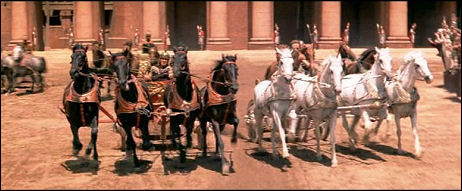
I have never felt quite so particularly thrilled as I have after scooting around that city. It’s glorious. It’s almost like taking part in the chariot race in Ben-Hur. A Rome-residing HE reader named “Nola” implied yesterday that the Roman streets are full of Stephen Boyds with metal knife blades sticking out of their chariot wheels. As Jake La Motta would say, “That’s in yo’ mind!” I’ve never run into that at all.
Even my late sister, a disabled woman who hid indoors for most of her life, fell in love with the experience.
Two Sides of the Fence
New York‘s Vulture guys, assessing the so-far universal praise for Pixar’s WALL*E, are trying to kick-start a campaign to give it a “real” Best Picture Oscar next February instead of — in their minds — an allegedly downgraded substitute tribute in the form of a Best Animated Feature Oscar.
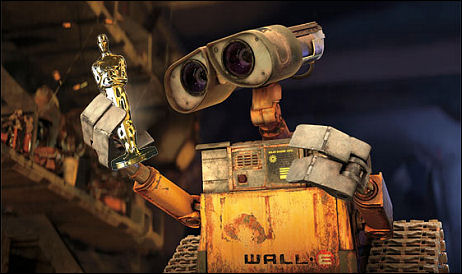
This is wrong, fellas. The animated realm means an emphasis on digital as opposed to organic raw-grain realism, and the Best Picture realm still means more or less the opposite. We’re obviously living in a world of increasing overlap between them — reality ain’t what it used to be — but distinctions must be recognized and the electric segregation fence must be respected and fortified. Question is, on which side of the fence is the grass greener in terms of creative possibility and realization? It’s debatable.
WALL*E is a glorious film, but there would be nothing the least bit diminishing if it takes the Best Animated Feature Oscar. It would be honorable and appropriate and a good thing all around. The Chicago Tribune‘s Michael Phillips has called WALL*E “the best science-fiction film so far this year, the best romance so far this year and the best American studio film so far this year.” True, but it doesn’t belong in the raw reality arena and its admirers (myself among them) know it.
“Could this be the year that the Academy finally realizes that Pixar movies are the closest Hollywood comes anymore to the great, classy populist entertainments that used to be nominated for a gazillion Oscars?,” the “Vulutre” piece says, “the kinds of movies that everyone complains have disappeared from the Academy Awards?”
That’s a largely true statement, I feel, but WALL*E is, I feel, an exception to the animation realm. The Pixar economy, invention and poetry bestow an unusual profoundity and a universal appeal, but it’s still — get real for a second — fundamentally made for and aimed at families, kids, X-factor moviegoers and film critics. And it uses a certain kind of paint and paint-brushes that are specifically intended to stir the imagination and summon metaphor.
In a certain way, WALL*E obviously reflects and recreates the world that we’ve built, that has been given to us, that we’re stuck in for better or worse. But only in that way. It’s fundamentally (and to its enormous credit) a dreamscape movie, and creating in that world requires a very specific discipline and sensibility that doesn’t vote, doesn’t pay bills, doesn’t enjoy the string and the brass on Miklos Roza‘s El Cid soundtrack, doesn’t drink good Pinot Grigio at parties, doesn’t pay $4.40 for a gallon of gas, doesn’t buy sour cream-and-onion potato chips at a 7-11 at 11:45 pm and doesn’t recoil from the lack of hygiene at a gas-station restroom.
There is an enormous high and an unfettered dignity that comes from simply aiming a camera at real people and real locations and making it all sing. Every now and then it happens. We all know there’s magic on the animation side of the fence, but the people who work it need to invest in their own land, sing their own songs, beat their own drums, wave their own flag and stay the fuck out of Reality Nation.
Screw CGI
In a 6.23 Wired piece, Scott Brown has portrayed — emphasized — director Chris Nolan‘s commitment to keeping the hard-drive special effects down to a minimum in The Dark Knight. “For Nolan, reality beats the hell out of gee-whiz special effects,” Brown writes. And to this goal, Nolan has “a cogent Theory of Applied Batmatics,” which means an “insist[ance] on reality — no effects, no tricks — up to the point where insisting on reality becomes unrealistic.
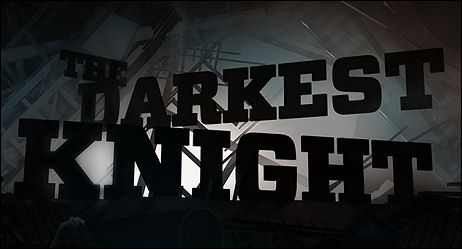
“Then, in post-production, make what is necessarily unreal as real as possible. ‘Anything you notice as technology reminds you that you’re in a movie theater,’ Nolan explains. ‘Even if you’re trying to portray something fantastical and otherworldly, it’s always about trying to achieve invisible manipulation.’ Especially, he adds, with Batman, ‘the most real of all the superheroes, who has no superpowers.’
“How ‘real’ are we talking here? When Nolan unveiled a six-minute Knight prologue on Imax screens last December (a twisty bank heist with a jarring Joker reveal), it was clear that his cinematic vision owes more to director Sidney Lumet than golden-age DC comics. You can feel the tension of Lumet’s 1975 Dog Day Afternoon and Michael Mann‘s 1995 drama, Heat.”
Inevitably Ledger’s?
“I just returned from a Dark Knight screening” — the one for junketeers they had last night at the Bridge — “and I wanted to commit this to a public forum as quickly as possible,” KTLA’s Sam Rubin wrote last night at 10:27 pm. “Heath Ledger‘s Joker is a blockbuster performance, and he will absolutely be nominated for an Oscar. And at this point in the year, Ledger is also a hands-down favorite to win it posthumously.
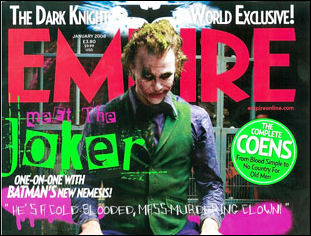
“Ledger offers perfect pitch, perfect tone…hits all the right notes. The Dark Knight is among the better super-hero movies of all time, and Ledger is the best villain in a super-hero movie of all time. Really. It will only add to the conversation [about] all that Ledger could have accomplished had he lived. Amazing work.”
If you’re going to give Ledger the Oscar at this stage — which is fine if Rubin really believes it to be a fact waiting to happen — aren’t you obliged to use adjectives that are a little more intriguing than “perfect” and “right”? Shouldn’t you try to describe the highs and contours of the performance, at least a little bit?
If I’d been there I would be posting at least two or three descriptive graphs of my reaction to Ledger’s performance. If I’d been invited, I mean. I’ve been hot to see this for months and months, like everyone else. But Warner Bros. publicity shut the door last September or October over very little — a certain party had a hissy fit — and a certain Manhattan-based distrib exec, in a show of manly resolve, refuses to reply to make-nice e-mails.
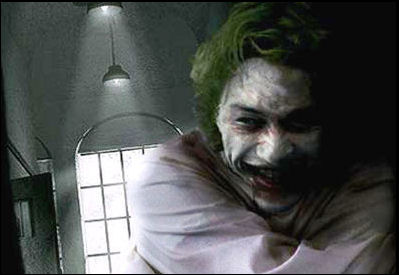
LAFF Thursday Night
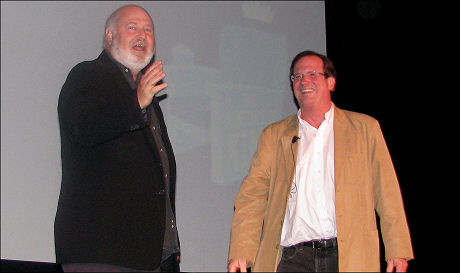
Rob Reiner, Pete Hammond just before pre-screening q & a at Billy Wilder theatre — Thursday, 6.26.08, 8:08 pm. A screening of Reiner’s The American President followed.
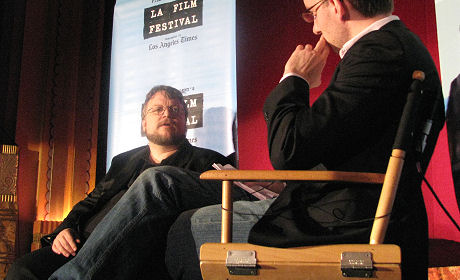
Guillermo del Toro, director of Hellboy 2: The Golden Army, and intelligent but obsequious questioner during q & a at Westwood’s Crest theatre — Thursday, 6.26, 7:15 pm.
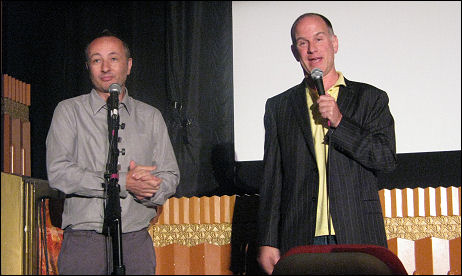
Fenton Bailey (l.) and Randy Barbato (r.), directors of Heidi Fleiss: The Would-Be Madam of Crystal, following Thursday night’s 9:30 pm screening at Westwood’s Crest theatre — 6.26, 10:55 pm.

Guillermo del Toro, director of Hellboy 2: The Golden Army, during q & a at Westwood’s Crest theatre — Thursday, 6.26, 7:15 pm.

Dawn Hudson, Rob Reiner at Westwood’s Billy Wilder theatre — 6.26, 8:05 pm.
Ardor Cools
The best thing about He’s Just Not That Into You, a New Line release that was supposed to come out on 10.24.08, has been the very cool title. Perhaps that’s the only cool thing about it. A 6.26 Life & Style article is reporting that the release date of this Ken Kwapis film, a romantic dramedy costarring Jennifer Aniston, Jennifer Connelly, Scarlett Johansson, Ben Affleck, Drew Barrymore, Justin Long and Bradley Cooper, has been pushed back to February 6, 2009. Which means, of course, that Warner Bros. distribution chiefs don’t have a lot of confidence in it. Is there another way to interpret this, if true?


